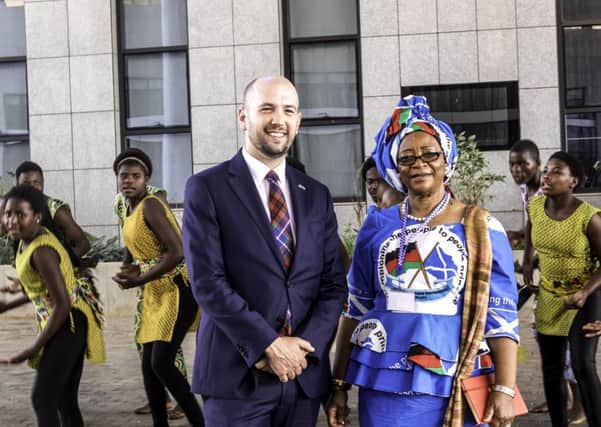David Hope-Jones: Best of friends '“ no wonder UN has praised Scotland's links with Malawi


After the meeting, Scotland wanted to honour this commitment, to do its bit. So it turned to arguably its oldest and strongest partnership in Africa, its 150-year-old friendship with Malawi which had begun with Dr David Livingstone.
Less than four months after the G8, in November 2005, the Scottish Parliament hosted the seminal Malawi after Gleneagles conference. Government, parliament and civic representatives from both Scotland and Malawi came together to explore the next chapter of this bilateral friendship.
Advertisement
Hide AdAdvertisement
Hide AdThis was an exciting new approach to international development. Crucially, it was not driven solely by government and not defined by a conventional sense of one-way charity.


Individuals and organisations, big and small, came together alongside the leaders of government and parliament to agree how best to further enhance the friendship. It was a collective nation-to-nation and people-to-people effort.
During this conference, a ground-breaking inter-governmental co-operation agreement was signed between the then First Minister of Scotland and the president of Malawi. Fast forward 13 years, and perhaps what is so remarkable, is that this ambitious and mould-breaking spirit of dignified bilateral cooperation is stronger now than ever before.
The University of Edinburgh estimates that 109,000 Scots and 208,000 Malawians are working together through 1,200 individual partnerships each year, leveraging £49 million of inputs from churches, schools, universities, hospitals, businesses and community groups, and benefiting 260,000 Scots and 2.9 million Malawians annually.
Just as significant, and a sure sign of the legacy this friendship is having, research led by the University of Glasgow estimates that 45 per cent of Scots can name a friend or a family member with a link to Malawi, with the overwhelming majority of Scots supporting such links.
This spirit of dignified partnership has not just survived, it has thrived. It continues to inspire generation after generation of young Scots to become involved; choosing to embrace a sense of informed and progressive internationalism, not out of any sense of pity or charity, but in friendship, respect and solidarity.
Given that reciprocity was a guiding principle of the 2005 conference, there was a natural expectation that the time would come for Malawi to host a ‘return fixture’.
With the signing of a renewed inter-governmental agreement when the president of Malawi visited Scotland in the spring, it became clear that the time was ripe for a second nation-to-nation gathering.
Advertisement
Hide AdAdvertisement
Hide AdThis time Malawi took the lead in organising with the Malawi and Scotland: Together for Sustainable Development conference held in Lilongwe at the end of September.
After 13 years of partnership and collaboration across a variety of fields, it was timely to take stock of progress and to look with ambition to the future, particularly with the 2030 horizon of the UN Global Goals in view. As the UN has stated, this is precisely the sort of “new global partnership” which is essential for the Global Goals to succeed and a model for others to follow.
While the conference celebrated our nations’ shared history, far from being something that belongs to the past, it concluded that the relationship has proved to be one of urgent contemporary relevance.
As Scotland has recovered its identity and purpose in the 21st century, it has sought to be a responsible global citizen and the rekindling of its long-running relationship with Malawi has been a valued, highly significant focal point. As Malawi has sought to meet the challenges of extreme poverty and underdevelopment, it has found in Scotland a partner with distinctive and valued qualities.
Trust and mutual confidence have been built up over generations and this provides invaluable social capital that is being put to work today.
Throughout the conference, there was a palpable spirit of collaboration, breaking down barriers between different players within and between each country.
It is to the immense credit of both governments that they have resisted the temptation to follow the well-worn, and increasingly discredited approach of top-down, consultant-led, one-way development support and have instead valued the breadth, depth and diversity of links that the people of our two nations enjoy.
Successive governments, and countless parliamentarians, have had the vision and foresight to champion this distinctive model, this long shared history, and this spirit of dignified collaboration.
David Hope-Jones OBE, chief executive, Scotland Malawi Partnership.